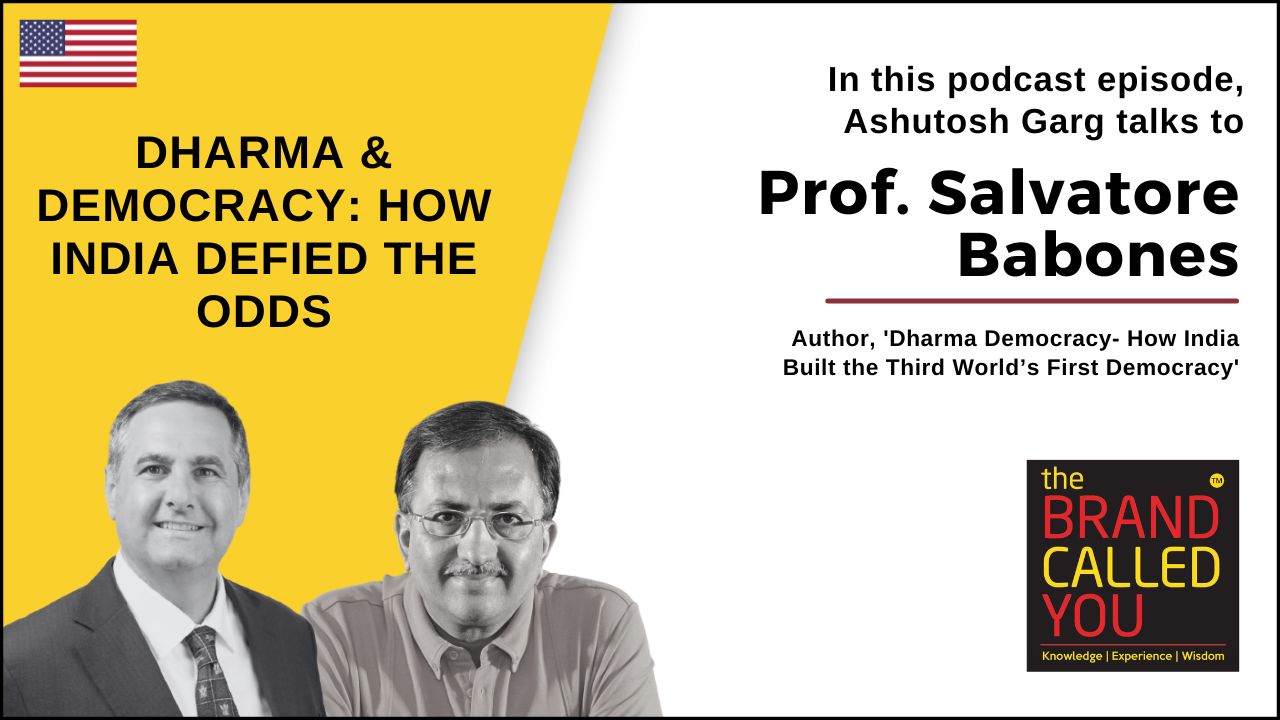Prof. Salvatore Babones, University of Sydney: Rethinking Indian Democracy
- Initially set out to write on India’s economy, shifted focus to democracy after editorial resistance and recognizing the vital role of Hindu civil society.
- Argues India’s democracy thrives due to civil society networks, not state policies or Hindu faith alone.
Podcast
Overview
In this edition of TBCY (The Brand Called You), host Ashutosh Garg interviews Professor Salvatore Babones about his new book, Dharma Democracy: How India Built the World’s First Third World Democracy. Babones explores the philosophical, cultural, and institutional roots of Indian democracy, offering a fresh perspective for global and Indian audiences alike.
00:01:05- What motivated Babones to write “Dharma Democracy”?
- Initially set out to write on India’s economy, shifted focus to democracy after editorial resistance and recognizing the vital role of Hindu civil society.
- Argues India’s democracy thrives due to civil society networks, not state policies or Hindu faith alone.
00:04:44- How is “Rashtra Dharma” different from Western civic duty?
- Indian democracy centers on collective duty (Rashtra Dharma), not individual rights as in the West.
- The Indian Constitution uniquely includes a charter of duties.
00:06:46- What role did Aurobindo and Gandhi play in Indian democracy?
- Both emphasized duties to society over rights, influencing democratic values with deep philosophical roots.
00:08:50- Why do India’s founding leaders matter in global democracy theory?
- Indian founders wrote comprehensive books on democracy, education, and society—these are under-explored outside India (and even inside it).
00:11:19 & 00:14:58- How does India reconcile pluralism, and how do BJP and Congress differ?
- Actual communal violence has dropped over decades; integration challenges remain, especially for India’s Muslim population.
- BJP’s nationhood is infused with Hindu cultural identity, contrasting Congress’s more secular, though sometimes rhetorical, approach.
RESOURCES:
Learn more about Prof Salvatore Babones: Linkedin
Enjoyed this podcast?
If you learned about how India Built the Third World’s First Democracy.” Trust me, you need to hear these perspectives! Share these insights with friends!
Would you love to give us 5 stars? ⭐⭐⭐⭐⭐ If yes, we’d greatly appreciate your review. Help us reach more people to keep them in the know as we talk to leaders, high achievers, and thought leaders from diverse backgrounds and nationalities. Excellence can come from anywhere, stay in the know, and hear from emergent high achievers and gurus.
Stay updated with what’s shaping the world today through the latest The Brand Called You Podcast episode. Follow us on iTunes, Spotify, and Anchor.fm.
You can find us at:
Website: www.tbcy.in
Instagram: http://bit.ly/3HO7N06
Facebook:http://bit.ly/3YzJOaD
Twitter: http://bit.ly/3wMBOXK
LinkedIn: https://www.linkedin.com/company/tbcy/
YouTube: http://bit.ly/3jmBqfq
Chingari: https://chingari.io/tbcypodcast
Josh: http://bit.ly/3WWP0nB
Thanks for listening!
Profile
- Initially set out to write on India’s economy, shifted focus to democracy after editorial resistance and recognizing the vital role of Hindu civil society.
- Argues India’s democracy thrives due to civil society networks, not state policies or Hindu faith alone.


